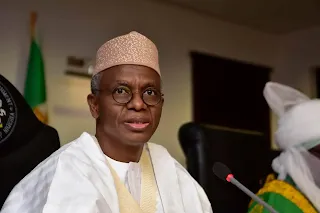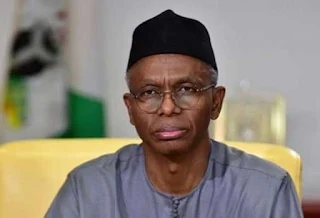Malam Nasir Ahmad El-Rufai was born on 16 February 1960 in Fagge, Kano State, Nigeria, but he is originally from Zaria, Kaduna State. He lost his father at a young age and was raised by his uncle, who ensured he received a good education.
El-Rufai attended Barewa College, Zaria, where he excelled academically and was awarded the "Best Graduating Student" in 1976. One of his classmates at Barewa College was former Nigerian President Umaru Musa Yar'Adua.
He later studied Quantity Surveying at Ahmadu Bello University (ABU), Zaria, graduating with a First-Class degree in 1980. He furthered his education with postgraduate studies in Business Administration, Law, and Public Administration from prestigious institutions such as Harvard University and Georgetown University in the United States.
Career Before Politics
Before joining politics, El-Rufai was a successful entrepreneur and consultant.
- He co-founded El-Rufai & Partners, a quantity surveying and project management consulting firm that handled projects for major international clients, including the World Bank and multinational companies.
- His private sector experience gave him strong financial and administrative expertise, which later influenced his leadership style in government.
Political Career
Director-General of the Bureau of Public Enterprises (BPE) (1999–2003)
In 1999, President Olusegun Obasanjo appointed El-Rufai as the Director-General of the Bureau of Public Enterprises (BPE) and Secretary of the National Council on Privatization.
- In this role, he led Nigeria’s privatization program, overseeing the sale of government-owned enterprises to private investors.
- His tenure at the BPE was marked by economic reforms aimed at reducing government control in key industries and promoting private sector growth.
Minister of the Federal Capital Territory (FCT) (2003–2007)
El-Rufai was appointed as the Minister of the Federal Capital Territory (FCT) by President Obasanjo in 2003. His tenure as FCT Minister was one of the most controversial and impactful in Nigeria’s history.
Key Achievements as FCT Minister:
-
Urban Development and Demolition Exercise
- El-Rufai embarked on an aggressive urban renewal project, demolishing illegal structures and enforcing Abuja’s original master plan.
- His demolition campaign affected thousands of residents, including politicians and business elites, earning him both praise and criticism.
-
Public Sector Reforms
- He introduced transparency measures in land allocation and real estate development in Abuja.
- He also implemented civil service reforms, which led to the retrenchment of corrupt and inefficient public officials.
-
Infrastructure and Transportation
- El-Rufai prioritized the development of roads, drainage systems, and modern public transportation in the FCT.
- His policies reshaped Abuja into a more organized and structured city.
Despite criticism, El-Rufai’s tenure as FCT Minister was widely regarded as one of the most effective in Nigerian history.
Post-Ministerial Years and Exile (2007–2010)
After leaving office in 2007, El-Rufai became a target of political persecution under President Umaru Musa Yar’Adua’s administration.
- He was accused of corruption and abuse of power, leading to legal battles with the Economic and Financial Crimes Commission (EFCC).
- Facing pressure, he went into self-imposed exile, during which he studied at Harvard University and engaged in international consultancy.
In 2010, El-Rufai returned to Nigeria after the death of President Yar’Adua and re-engaged in national politics.
Governorship of Kaduna State (2015–2023)
First Term (2015–2019)
In 2015, El-Rufai contested and won the Kaduna State governorship election under the All Progressives Congress (APC). His victory was largely attributed to his anti-corruption stance, technocratic experience, and support from President Muhammadu Buhari.
Major Reforms in Kaduna State:
-
Education Reforms
- He sacked over 22,000 unqualified teachers and replaced them with new ones through a rigorous selection process.
- He introduced free primary and secondary school education for all children in Kaduna State.
-
Security Measures
- Kaduna, known for ethnic and religious tensions, faced security challenges during his tenure.
- El-Rufai established a security committee and supported military operations to combat banditry, kidnapping, and communal conflicts.
-
Public Sector Reforms
- His government reduced the number of ministries and political appointees, cutting costs and improving governance efficiency.
- He also introduced electronic land registration to curb corruption in land administration.
Second Term (2019–2023)
El-Rufai was re-elected in 2019, despite facing opposition from powerful political figures and critics.
Key policies in his second term included:
- Continuation of infrastructural development, including road projects and modern markets.
- Further security measures, including creating a Kaduna State Vigilante Service.
- Privatization of state-owned assets to generate revenue.
However, his second term was also controversial, particularly due to:
- Mass sackings of civil servants, which led to labor union protests.
- Religious and ethnic tensions, as some groups accused him of bias in governance.
- Security challenges, including increased kidnappings and attacks in Southern Kaduna.
Ministerial Nomination Controversy (2023)
After leaving office in May 2023, El-Rufai was nominated as a minister by President Bola Ahmed Tinubu. However, his nomination was rejected by the Senate, allegedly due to security concerns.
In an interview with Arise News, El-Rufai denied these claims, stating that President Tinubu personally withdrew his nomination. He also expressed disappointment in the APC government, accusing it of abandoning its original objectives.
Political Influence and Speculated Future Moves
- Despite being a founding member of the APC, El-Rufai has recently criticized the party, hinting at potential political realignment ahead of the 2027 elections.
- He has been seen engaging with opposition figures, including Atiku Abubakar (PDP) and members of the Social Democratic Party (SDP).
- While he has denied immediate plans to leave the APC, he stated: "I am not leaving the APC; the APC has already left me."
Personal Life
El-Rufai is married to three wives and has several children, including Bello El-Rufai, a former House of Representatives member. He is known for his outspoken personality and strong political views.
Legacy and Impact
Nasir El-Rufai is considered one of Nigeria’s most influential and controversial politicians. His strong leadership, bold reforms, and fearless stance against corruption have earned him both praise and criticism.
Whether he will contest in the 2027 presidential election or shift to another political movement remains to be seen, but his influence in Nigerian politics remains significant.





